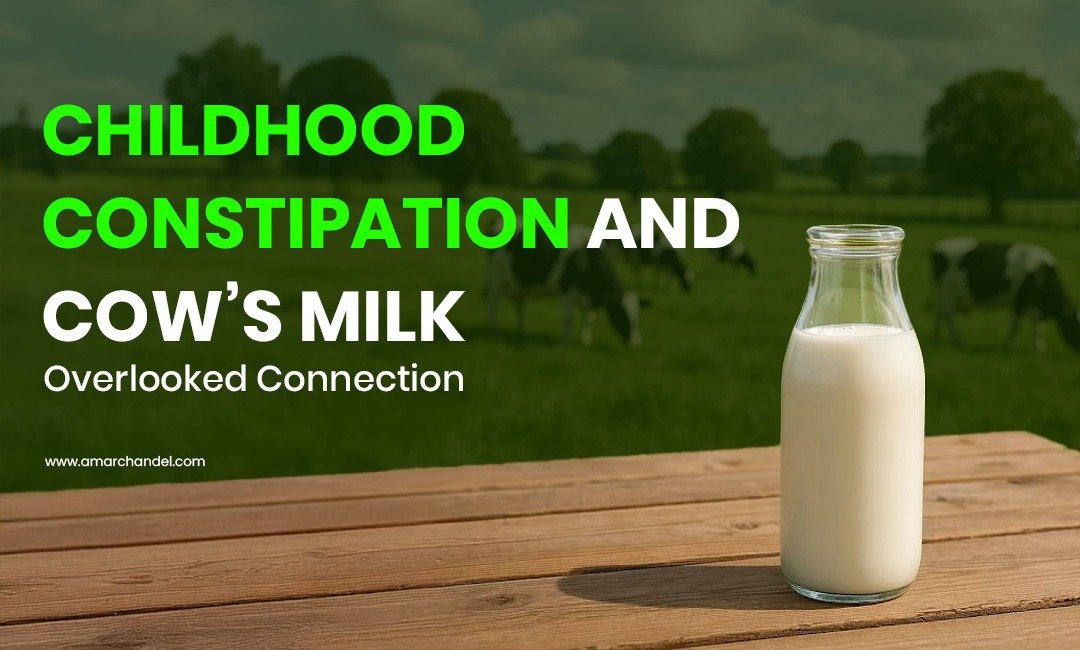Chronic constipation among children is a growing health concern, often dismissed or misattributed to lifestyle, low fibre intake, or dehydration. However, an emerging body of research—some of it dating back decades—suggests a less acknowledged but highly significant trigger: cow’s milk protein intolerance (CMPI).
As early as the 1950s, European pediatricians hinted at a possible link between cow’s milk and constipation in children, but this hypothesis remained speculative until the 1990s. A groundbreaking 1998 study by Iacono et al., published in The New England Journal of Medicine, provided compelling clinical evidence.
In a double-blind crossover trial, 65 children with intractable constipation—unresponsive to standard treatment—were given either cow’s milk or soy milk for two weeks, followed by a switch. Constipation resolved in 68% of children while on soy milk, but reappeared within 24–48 hours of reintroducing cow’s milk. Notably, severe anal fissures—painful tears at the anal opening—also healed when cow’s milk was withdrawn and returned upon reintroduction. [Source: NEJM, 1998;339:1100–1104]
This finding was later supported by global studies, including a 2013 trial where children were taken off all forms of dairy, not just milk. This time, 100% of cases of chronic constipation resolved within days. [Source: J Pediatr Gastroenterol Nutr. 2013;56(6):663–7]
In India, where dairy is a deeply integrated part of the traditional diet—from milk and curd to ghee, paneer, and sweets—this discovery is particularly significant.
A recent study from AIIMS Delhi (2021) observed that nearly 30–40% of children with chronic constipation were potentially suffering from unrecognised cow’s milk protein allergy (CMPA). Unfortunately, these cases are often misdiagnosed as behavioural issues or treated indefinitely with laxatives. [Source: Indian Pediatrics, 2021]
India also has a high rate of cow’s milk consumption in early childhood, with many infants introduced to animal milk within the first year, despite WHO guidelines recommending exclusive breastfeeding for 6 months. This early introduction may sensitise the gut and immune system, making the infant more vulnerable to milk protein intolerance.

In children who are sensitive to cow’s milk protein, its consumption can lead to:
• Rectal inflammation, as confirmed by biopsy studies.
• Increased gut wall permeability and immune responses.
• Reduced gut motility, leading to hardened stools and delayed evacuation.
The inflammation causes pain, resulting in stool withholding behaviour, which worsens constipation over time. This can evolve into chronic anal fissures, bleeding, and psychological distress, creating a vicious cycle.
Clinical Red Flags
Signs that a child’s constipation may be linked to cow’s milk include:
• Onset in the first year of life after starting cow’s milk.
• Coexisting symptoms like eczema, wheezing, or diaper rash.
• History of anal fissures or blood in stool.
• Family history of food allergies or atopic disorders.
The Cultural Barrier: Dairy Reverence vs. Health Reality
In Indian culture, cow’s milk holds religious and symbolic significance. It’s commonly believed to be “satvik” and universally beneficial. However, it’s essential to differentiate spiritual symbolism from medical evidence. While cow’s milk may be nourishing for many, in some children, it behaves more like a pathogen than a panacea.
Just as lactose intolerance is now widely accepted in India (particularly among South Indians), cow’s milk protein intolerance must be recognised—not as a defiance of tradition, but as a rational step toward individualised child health care.
Recommended Approach for Parents and Pediatricians
1. Milk Elimination Trial:
For any child with chronic constipation unresponsive to diet or laxatives, try removing all cow’s milk and dairy products (milk, curd, paneer, ghee, butter, sweets) for 2–3 weeks.
2. Soy or Rice Milk Substitution:
Offer calcium-fortified soy milk (or rice milk) during the trial. Some children may also tolerate nut milks (like almond), though these are less common and pricier in India.
3. Monitor Eczema and Respiratory Symptoms:
Many children also show improvements in eczema, chronic cough, or wheezing, confirming milk protein hypersensitivity as a systemic condition.
4. Rechallenge if Needed:
A supervised milk rechallenge may be done by a pediatric allergist to confirm the diagnosis.
From Laxatives to Liberation
In most government hospitals across India, chronic constipation in children is still treated with bulk-forming or stimulant laxatives like lactulose, bisacodyl, or polyethylene glycol. But many children continue to suffer for months or years, never finding relief until the root cause—cow’s milk—is removed.Childhood Constipation and Cow’s Milk: Overlooked ConnectionIn most government hospitals across India, chronic constipation in children is still treated with bulk-forming or stimulant laxatives like lactulose, bisacodyl, or polyethylene glycol. But many children continue to suffer for months or years, never finding relief until the root cause—cow’s milk—is removed.
The latest guidelines from Indian Academy of Pediatrics (IAP) also acknowledge CMPI as an important differential diagnosis in chronic refractory constipation. [Source: IAP Textbook of Pediatrics, 2023 Edition]
Cow’s milk protein may be a major hidden cause of chronic constipation in Indian children—particularly when standard treatments fail. A simple, supervised dairy elimination trial can often resolve symptoms rapidly, sometimes within 48 hours. Given the cultural prevalence of milk in Indian diets, raising awareness among parents, doctors, and caregivers is crucial.
Health isn’t one-size-fits-all—even when it comes to milk.


Give a Reply